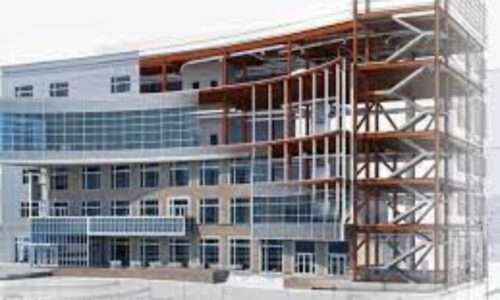Full-Stack Web Development
Overview Full-stack web development refers to the process of developing a web application or website that involves both front-end and back-end development. This means that a full-stack developer has the skills and knowledge to work on both the client-side (what users see in their browser) and the server-side (the logic …
Overview
Benefits of Learning
- Versatility: Full-stack developers have a broad skill set and are equipped to work on both the front-end and back-end of web applications. This makes them versatile and able to handle a range of tasks and challenges that arise during the development process.
- Career Opportunities: Full-stack developers are in high demand as they have a wide range of skills that are valuable to companies across many industries. By learning full-stack web development, you’ll be equipped with the skills needed to pursue a career in this growing field.
- Entrepreneurial Opportunities: With a solid understanding of full-stack web development, you can build your own web applications or start your own business. This can be a great option for those who want to work for themselves or have an entrepreneurial spirit.
- Collaboration: Full-stack developers are often able to collaborate with different members of a development team, including front-end and back-end developers, as well as designers and project managers. This collaborative approach can lead to more efficient and effective development processes.
- Problem Solving: Full-stack development requires a high level of problem-solving skills, as developers need to be able to work through complex coding challenges and troubleshoot issues that arise during development.
Overall, learning full-stack web development can be a valuable investment in your career and can open up a range of opportunities in the tech industry.
Who can Learn
However, it is important to have a solid foundation in programming concepts and experience in at least one programming language before learning full-stack web development. Some common programming languages used in full-stack development include JavaScript, Python, Ruby, and Java.
In addition, it is helpful to have a good understanding of web development concepts such as HTML, CSS, and basic front-end development skills.
Full-stack web development can be a great fit for individuals who enjoy problem-solving, have strong attention to detail, and are interested in building web applications that are both functional and user-friendly.
Whether you are a beginner or an experienced programmer, there are many online resources, boot camps, and courses available to help you learn full-stack web development.
Career Scope
- Full-Stack Web Developer: As a full-stack web developer, you would be responsible for designing and developing both the front-end and back-end of web applications. You would work with a range of technologies and programming languages to create responsive and efficient applications that meet client or business needs.
- Front-End Developer: As a front-end developer, you would focus on the client-side of web applications, using technologies such as HTML, CSS, and JavaScript to create user interfaces that are visually appealing and easy to use. You may work closely with designers to ensure that the application meets both functional and design requirements.
- Back-End Developer: As a back-end developer, you would focus on the server-side of web applications, using programming languages like Python, Ruby, or Java to build the logic and functionality of the application. You would ensure that the application is stable, secure, and efficient.
- Web Application Developer: As a web application developer, you would be responsible for creating and maintaining web applications for businesses or clients. This could involve building custom applications or using existing frameworks to develop solutions that meet specific business needs.
- Software Engineer: Full-stack web development skills can also be valuable for software engineering roles, which involve designing and developing software applications across a range of industries and sectors.
Overall, full-stack web development skills are highly in demand and can open up a range of exciting career opportunities in the tech industry.
Salary Package with Job Role
In India:
- Full-Stack Web Developer: Rs 3-12 lakh per year (depending on experience and company size)
- Front-End Developer: Rs 2-8 lakh per year (depending on experience and company size)
- Back-End Developer: Rs 3-12 lakh per year (depending on experience and company size)
- Web Application Developer: Rs 3-10 lakh per year (depending on experience and company size)
- Software Engineer: Rs 4-15 lakh per year (depending on experience and company size)
In Foreign:
- Full-Stack Web Developer: $60,000 to $120,000 per year (depending on experience and location)
- Front-End Developer: $50,000 to $100,000 per year (depending on experience and location)
- Back-End Developer: $60,000 to $120,000 per year (depending on experience and location)
- Web Application Developer: $60,000 to $110,000 per year (depending on experience and location)
- Software Engineer: $70,000 to $150,000 per year (depending on experience and location)
Note that these are rough estimates, and actual salaries can vary depending on many factors. It is also worth noting that salaries may be higher in certain locations or for developers with more experience or specialized skills.
Requirements To Study
- Basic Computer Skills: Full-stack web development involves working with computers and software applications. Therefore, having basic computer skills, such as using a keyboard and mouse, navigating the internet, and using basic software applications, is necessary.
- Programming Fundamentals: Having a foundational understanding of programming concepts and experience in at least one programming language is important for full-stack web development. Concepts like variables, data types, loops, and functions are common to most programming languages and will be used throughout the development process.
- Basic Web Development Knowledge: A basic understanding of web development concepts such as HTML, CSS, and JavaScript can be helpful for full-stack web development. These languages are the building blocks of web development and understanding them will help you create dynamic and responsive web applications.
- A Strong Work Ethic: Full-stack web development can be challenging, and requires hard work and dedication to master the various technologies and programming languages involved. It is important to have a strong work ethic and willingness to learn in order to succeed in this field.
- Access to a Computer: Full-stack web development involves working with a variety of software applications and tools, so having access to a computer is necessary for practicing and developing your skills.
Overall, having a strong foundation in programming concepts and a willingness to learn is key to becoming a successful full-stack web developer.
Key Features
- Comprehensive Curriculum: A good full-stack web development course should cover a range of programming languages, tools, and frameworks, and provide a solid foundation in front-end and back-end development.
- Hands-On Learning: Full-stack web development involves practical application of programming concepts, so a good course should offer plenty of opportunities for hands-on learning through projects, assignments, and coding challenges.
- Experienced Instructors: Look for courses taught by experienced instructors who have worked in the industry and have a strong understanding of full-stack web development. They should be able to provide insights and real-world examples that illustrate how to apply programming concepts.
- Flexibility: Online courses with flexible schedules can be helpful for individuals who need to balance work or other commitments. Look for courses that offer on-demand access to course materials, pre-recorded lectures, and the ability to learn at your own pace.
- Career Support: A good full-stack web development course should provide career support and resources, such as career counseling, job placement assistance, and networking opportunities.
- Capstone Project: Completing a capstone project is a valuable way to showcase your skills and build a portfolio of work that can be used to demonstrate your abilities to potential employers. Look for courses that offer a capstone project as part of the curriculum.
Overall, a good full-stack web development course should provide a well-rounded education that prepares you for a career in web development, and offer hands-on learning opportunities, flexibility, and career support.
Course Curriculum
Module 1. Introduction to Web Development:
- Overview of web development, client-server architecture, web protocols, and web standards.
Module 2. HTML, CSS, and JavaScript:
- Fundamentals of HTML (Hypertext Markup Language), CSS (Cascading Style Sheets), and JavaScript, including DOM (Document Object Model) manipulation, event handling, and form validation.
Module 3. Front-End Development Frameworks:
- Introduction to front-end development frameworks such as React, Angular, or Vue.js, including component-based architecture, state management, and routing.
Module 4. Back-End Development:
- Introduction to back-end development technologies such as Node.js, Python, or Ruby, including server-side programming, database integration, and API (Application Programming Interface) design.
Module 5. Relational Databases:
- Fundamentals of relational databases, SQL (Structured Query Language) and NoSQL databases, and database design and management.
Module 6. Web Application Security:
- Overview of common web application vulnerabilities, best practices for web application security, and tools and techniques for securing web applications.
Module 7. Deployment and DevOps:
- Overview of deployment processes and tools, continuous integration and deployment (CI/CD) pipelines, and containerization with Docker and Kubernetes.
Module 8. Agile Development Methodologies:
- Overview of agile development methodologies, including Scrum and Kanban, and best practices for team collaboration and project management.
Module 9. Capstone Project:
- Culminating project that puts your full-stack development skills to use, such as building a web application from scratch, integrating front-end and back-end technologies, and deploying the application to a production environment.
Overall, a comprehensive full-stack web development course will provide you with a solid foundation in both front-end and back-end development, and the technologies and best practices necessary to build and deploy web applications in a professional environment.
Instructor
Requirements
- Basic Computer Skills: Full-stack web development involves working with computers and software applications. Therefore, having basic computer skills, such as using a keyboard and mouse, navigating the internet, and using basic software applications, is necessary.
- Programming Fundamentals: Having a foundational understanding of programming concepts and experience in at least one programming language is important for full-stack web development. Concepts like variables, data types, loops, and functions are common to most programming languages and will be used throughout the development process.
- Basic Web Development Knowledge: A basic understanding of web development concepts such as HTML, CSS, and JavaScript can be helpful for full-stack web development. These languages are the building blocks of web development and understanding them will help you create dynamic and responsive web applications.
- A Strong Work Ethic: Full-stack web development can be challenging, and requires hard work and dedication to master the various technologies and programming languages involved. It is important to have a strong work ethic and willingness to learn in order to succeed in this field.
- Access to a Computer: Full-stack web development involves working with a variety of software applications and tools, so having access to a computer is necessary for practicing and developing your skills.
Features
- Comprehensive Curriculum
- Hands-On Learning
- Experienced Instructors
- Flexibility
- Career Support
- Capstone Project
Target audiences
- Anyone who is interested in web development and has a passion for technology can learn full-stack web development. There is no specific educational background or degree required to become a full-stack developer.
- Whether you are a beginner or an experienced programmer





